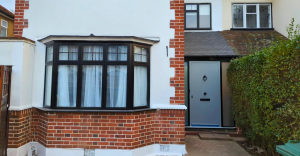Introduction
The entrance gate serves as the first line of defense for a home while also contributing to its overall aesthetic appeal. Whether for security, privacy, or design enhancement, selecting the right gate is crucial. Different gate types offer varying levels of protection, durability, maintenance requirements, and design compatibility.
This guide explores the various types of gates, their materials, advantages, and key considerations to help homeowners choose the best gate for their needs.
Key Factors to Consider When Choosing a Home Gate
Before selecting a gate, consider the following factors:
- Security Needs
- If security is a priority, opt for a strong material like steel or wrought iron.
- Automated gates with access control features provide enhanced security.
- Available Space
- Swing gates require more clearance for opening.
- Sliding or telescopic gates are ideal for limited spaces.
- Aesthetic Appeal
- The gate should complement the home’s architectural style.
- Various designs and materials are available to match modern, traditional, or rustic exteriors.
- Durability and Maintenance
- Metal gates last longer but may require rust prevention.
- Wooden gates need regular sealing and treatment.
- Budget Considerations
- Basic gates are more affordable, while high-tech automated gates are more expensive.
- The cost of materials, installation, and long-term maintenance should be factored in.
Types of Home Gates and Their Benefits
1. Swing Gates
- Description: Opens inward or outward on hinges, similar to a door. Available in single or double-panel designs.
- Best for: Homes with large driveways or spacious entrances.
- Advantages:
- Adds an elegant and traditional look.
- Can be manual or automated.
- Easy to install and operate.
- Disadvantages:
- Requires ample space for full opening.
- Can be difficult to operate in strong winds.
2. Sliding Gates
- Description: Moves sideways along a track, ideal for driveways with limited space.
- Best for: Urban homes and properties with space constraints.
- Advantages:
- Does not require additional space for opening.
- Suitable for automation and remote control systems.
- Strong and durable design.
- Disadvantages:
- Needs a track system, which requires maintenance.
- Higher initial cost compared to swing gates.
3. Folding Gates (Bi-Fold or Accordion Gates)
- Description: Consists of multiple panels that fold upon opening.
- Best for: Small driveways and compact entryways.
- Advantages:
- Space-saving design.
- Modern and stylish appearance.
- Available in both manual and automated versions.
- Disadvantages:
- Mechanical parts may require frequent maintenance.
- Higher cost due to complex design.
4. Telescopic Gates
- Description: Composed of multiple overlapping panels that slide over each other when opening.
- Best for: Homes with narrow entrances or limited driveway space.
- Advantages:
- Requires less space for operation.
- Smooth movement and fast operation.
- Ideal for automation.
- Disadvantages:
- Expensive compared to conventional sliding gates.
- Complex installation process.
5. Wrought Iron Gates
- Description: Made from heavy-duty iron with intricate designs, offering a combination of security and elegance.
- Best for: Classic and Victorian-style homes.
- Advantages:
- Highly durable and long-lasting.
- Customizable with decorative patterns.
- Provides maximum security.
- Disadvantages:
- Requires maintenance to prevent rust.
- Can be expensive due to craftsmanship.
6. Wooden Gates
- Description: Crafted from natural wood, offering a traditional and warm aesthetic.
- Best for: Farmhouses, cottages, and homes with rustic designs.
- Advantages:
- Enhances privacy.
- Blends well with natural surroundings.
- Can be customized in various styles.
- Disadvantages:
- Susceptible to weather damage.
- Requires sealing or painting to maintain longevity.
7. Aluminum Gates
- Description: Lightweight, rust-resistant, and available in various modern designs.
- Best for: Homes in coastal areas due to corrosion resistance.
- Advantages:
- Low maintenance.
- Does not rust or corrode.
- Durable yet lightweight.
- Disadvantages:
- Not as strong as steel or iron.
- Can be more expensive than standard wooden gates.
8. PVC or Vinyl Gates
- Description: Made from synthetic materials that require minimal maintenance.
- Best for: Budget-conscious homeowners looking for an affordable solution.
- Advantages:
- Resistant to rot, rust, and pests.
- Lightweight and easy to install.
- Does not require painting or sealing.
- Disadvantages:
- Less durable than metal or wood.
- Limited color and design options.
Choosing the Best Gate for Your Home
Selecting the best gate depends on specific homeowner needs. Below is a summary guide for different requirements:
- For Maximum Security:
- Wrought iron or steel gates with automated locking mechanisms.
- For Limited Space:
- Sliding or telescopic gates that do not require additional clearance.
- For Aesthetic Appeal:
- Wooden gates for a natural look or wrought iron gates for a classic appearance.
- For Low Maintenance:
- Aluminum or PVC gates that resist weather damage and require minimal upkeep.
- For Modern Homes:
- Folding, telescopic, or aluminum gates with sleek designs and automated features.
- For Budget-Friendly Solutions:
- PVC or manually operated wooden gates that provide affordability with basic functionality.
For homeowners looking for durable and stylish metal gates, consider exploring this selection of high-quality metal gates, offering various designs and security features to match different home styles.
Conclusion
Choosing the right gate for a home is an important decision that impacts security, convenience, and visual appeal. Homeowners should carefully assess factors such as space availability, budget, maintenance requirements, and design compatibility before making a choice.
Whether selecting a traditional wrought iron gate, a modern sliding gate, or a budget-friendly vinyl option, the best gate should enhance both the safety and style of the property. Consulting with professionals and exploring customization options can further help in making the best decision for a long-lasting and functional home entrance.


